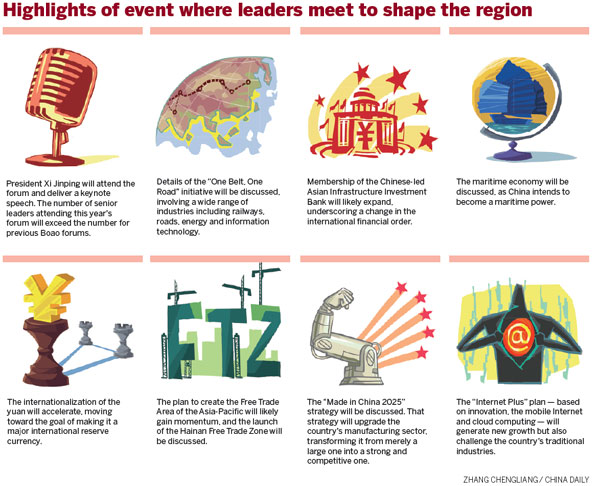Relationship depends on relinquishing of government power, according to panelists

Building a normal politics-business relationship was the focal point of the first panel of the Boao Forum for Asia Annual Conference 2015, as the panelists reached a consensus that rule of law and relinquishing of government power are the right way to achieve it.
The extensive anti-corruption campaign of recent years has exposed the extent to which the toxic politics-business relationship developed in the past. Since November 2012, 69 officials above vice-provincial level have been investigated, including four vice-state level officials.
These investigations revealed illegal associations between officials and businesspeople. The amount of bribery, collusion among corrupt officials and the sophistication of the bribery methods astonished the public.
"The process of China's reform and opening-up was accompanied by the retreat of State power and the advance of market power," said Bao Yujun, former vice-president of the China Private Enterprises Association. "However, the trend had been reversed for a period before 2012(when the 18th National Congress of the Communist Party of China took place). During that time our businesspeople were very depressed."
Bao said that, in theory, public power should serve the private business sector. However, in China, State power was so concentrated and overwhelming before 2012 that the success of Chinese entrepreneurs largely depended on specific policies.
He said that to get the politics-business relationship correct, the first requirement is rule of law, and the second requirement is the growth of business associations.
Long Yongtu, a former deputy trade minister and chief negotiator for China's accession to the World Trade Organization, argued that the rule of law is critical, setting a paradigm for officials and entrepreneurs to act properly.
"To address corruption, the first thing to do is to cut the power of officials so there is less room for payoff activities. However, that is an extremely painful process. When we negotiated the terms for China's accession to the WTO, the reduction of government power was a top issue, and we spent most of the time persuading officials to relinquish their power," he said. "We have to continue the effort and bring the power into the sunlight, because the current system is not fair enough for entrepreneurs," he said.
However, some panelists cautioned that a balance should be struck between scrutinizing officials and providing incentives for officials to act. Failure to do so would force officials to stay on the sidelines and avoid making a decision when one is needed. Zheng Yongnian, director of the East Asian Institute at the National University of Singapore, said it would be wrong to go to the other extreme of denying any normal relationship between officials and businesspeople.
"We found in East Asian nations that a close politics-business relationship was essential to their economies taking off. Without that relationship, it is hard to imagine the growth of conglomerates in Japan and South Korea," Zheng said.